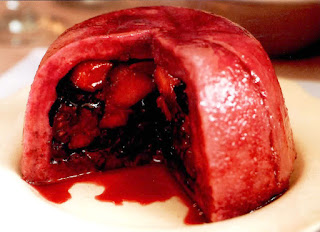To accompany this, something equally robust, but different needs to be offered. Which is why I am giving a recipe for a classic autumn pudding.
Slightly stewed autumn fruit pressed in a bread case. This is a real classic and its tartness offers a counterpoint to the beef.
Autumn Pudding
This is the winter equivalent of the more commonly known summer pudding. Personally, I like the darker and slightly sourer blend of fruit in the autumn pudding, so this is the one I make most often.Serves: 8
Ingredients:
1 loaf of white bread, crusts removed and sliced675g (6 cups) mixed soft fruit (eg blackberries, raspberries, late strawberries, soft plums, chopped, apples, chopped)
115g (1/4 lb) caster sugar
Method:
Use several of the bread slices to line the base and sides of a 1l (4 cup) pudding bowl or soufflé dish (ensure that you cut the bread so that the pieces fit closely together).Turn all the fruit into a wide, heavy-based saucepan, add the sugar, cover with a lid and slowly bring to a boil. Cook for 2 minutes, or until the sugar has dissolve and the juices from the fruit have run.
Take the pan off the heat and pour off 3 tbs of the juice (reserve this). Spoon the fruit and all the remaining liquid into the bread-lined dish then cut more slices of bread to cover the top. Put a plate that just fits inside the basin on top and weigh down with a heavy tin. Set aside in the refrigerator to press and chill over night (at least 8 hours).
Just before serving, remove the weight and the plate, cover the bowl with an inverted serving plate then turn upside down and unmould the pudding onto the plate. Use the reserved fruit juice to pour over any patches of bread that have not been completely soaked in the fruit juices.
Serve cold, cut into wedges and accompany with cream or crème fraîche.
I frequently make this with wild-foraged fruit myself, but you don't have to.
But if you are interested in wild foods in general, why not visit the Celtnet Wild Food recipes pages where there are over a thousand recipes for over 180 ingredients that can be sourced in the wild.











No comments:
Post a Comment